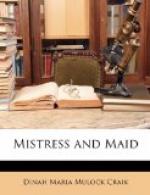“What’s bred in the bone will come out in the flesh.” “Like father like son.” “The sins of the parents shall be visited on the children.” So runs many a proverb: so confirms the unerring decree of a just God, who would not be a just God did He allow Himself to break His own righteous laws for the government of the universe; did He falsify the requirements of His own holy and pure being, by permitting any other wages for sin than death. And though, through His mercy, sin forsaken escapes sin’s penalty, and every human being has it in his own power to modify, if not to conquer, any hereditary moral as well as physical disease, thereby avoiding the doom and alleviating the curse, still the original law remains in force, and ought to remain, an example and a warning. As true as that every individual sin that a man commits breeds multitudes more, is it that every individual sin may transmit his own peculiar type of weakness or wickedness to a whole race, disappearing in one generation, re-appearing in another, exactly the same as physical peculiarities do, requiring the utmost caution of education to counteract the terrible tendencies of nature—the “something in the blood” which is so difficult to eradicate: which may even make the third and fourth generation execrate the memory of him or her who was its origin.
The long life-curse of Henry Leaf the elder, and Henry Leaf the younger, had been—the women of the family well knew—that they were men who “couldn’t say No.” So keenly were the three sisters alive to this fault—it could hardly be called a crime, and yet in its consequences it was so—so sickening the terror of it which their own wretched experience had implanted in their minds, that during Ascott’s childhood and youth his very fractiousness and roughness, his little selfishness, and his persistence in his own will against theirs, had been hailed by his aunts as a good omen that he would grow up “so unlike his poor father.”
If the two unhappy Henry Leafs—father and son—could have come out of their graves that night and beheld these three women, daughters and sisters, sitting with Ascott’s letter on the table, planning how the household’s small expenses could be contracted, its still smaller luxuries relinquished, in order that the boy might honorably pay for pleasures he might so easily have done without! If they could have seen the weight of apprehension which then sank like a stone on these long-tried hearts, never to be afterward removed: lightened sometimes, but always—however Ascott might promise and amend—always there! On such a discovery, surely, these two “poor ghosts” would have fled away moaning, wishing they had died childless, or that during their mortal lives any amount of self restraint and self compulsion had purged from their natures the accursed thing; the sin which had worked itself out in sorrow upon every one belonging to them, years after their own heads were laid in the quiet dust.




